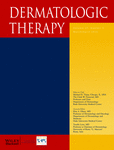Juvenile generalized pustular psoriasis treated with etanercept
Abstract
An 8-year-old boy with general pustular psoriasis (GPP) and iatrogenic secondary Cushing syndrome was treated successfully with etanercept after he had failed on acitretin, methotrexate, and methylprednisolone therapy. GPP is a severe and very rare variant of psoriasis in children often accompanied by life-threatening complications. Retinoids, cyclosporine, methotrexate, or dapsone used in a small number of case series and case reports were effective. Etanercept is a recombinant human tumor necrosis factor-alpha (TNF-alpha) receptor protein fused with Fc portion of IgG1 that binds to TNF-alpha, approved by Food and Drug Administration for the treatment of moderate-to-severe plaque psoriasis in children and teens who have not responded to other psoriasis treatments. In our patient, etanercept demonstrated significant clinical response associated with long-term efficacy without acute exacerbation, excellent tolerability, and good safety profile.




